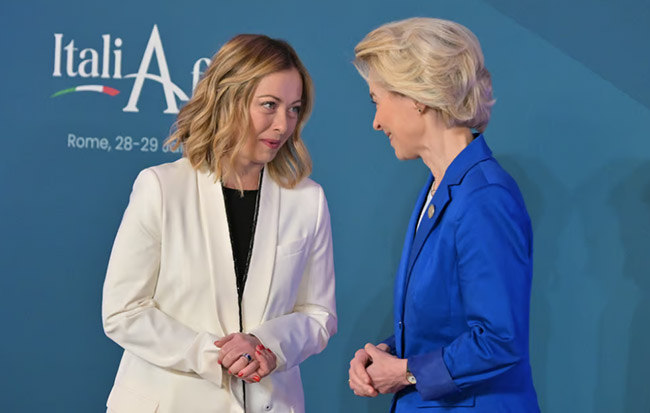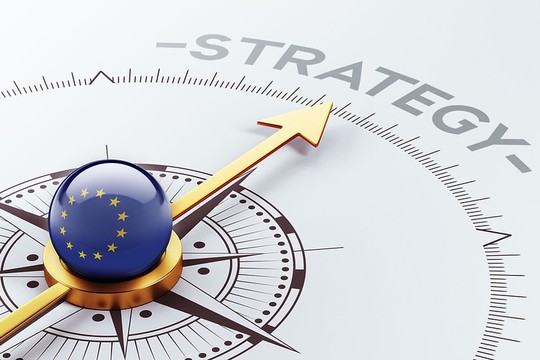How should we interpret the results of the EU parliamentary elections? – ‘The Counter Punch’ puts a question.
The first observation: in the EU elections held in all 27 member countries between 6 and 9 June 2024, voter turnout was once again very low. The average for the entire European Union was 51%. But keep in mind that countries where voting is compulsory also figure into the calculation of that average – for example Belgium, where voter turnout was 90%.
Without those countries, the rate of participation in the election would drop below the 50% mark. Out of the 27 EU member countries, 15 had a voter turnout of less than 50%. And the countries who recently joined the EU the rates were extremely low.
In Croatia the voter turnout was only 21.35%. Croatia only joined the EU in 2013, and did not become part of the Eurozone and the Schengen Area until 2023.
In Lithuania, which joined the EU in 2004, the voter turnout was 28.35%.
For the two other Baltic republics, the rate was 34% for Latvia and 37.6% in Estonia.
The other countries where participation in the election was low are: the Czech Republic with 36.45%, Slovakia at 34.40%, Portugal with 36.5%, Finland with 40.4, Bulgaria with 33.8% and Greece with 41.4% (and remember that voting is compulsory in the latter two!).
Italy’s rate (48,3%) was six percentage points lower than in 2019.
In France, the turnout was 51.50%.
Among the major countries of the European Union, only Germany is well above the 50% turnout mark, with 65%.
Conclusion : the majority of European Union citizens have no enthusiasm for the EU institutions and don’t see the point in exercising their right to vote. Citizens of the countries of the former Eastern Bloc or Southern Europe, who were full of hope when their countries became part of the EU or later the Eurozone or the Schengen Area are clearly disappointed by the promises of improved quality of life that have not come true.
Hopes of progress in the area of social rights have not materialized – quite to the contrary.
Whilst it sometimes adopts a few relatively positive resolutions, the European Parliament has no real power. It is the EU Commission and Council who make the real decisions; and the major countries like Germany and France have decisive influence there. And don’t forget the coercive role played by the European Central Bank on several occasions, as in the case of Greece in 2015, where it used its power to destabilize a government that was not docile enough in following the policies set by the EU’s real leaders.
Those policies are forced on the populations by the governments of the countries who dominate the EU economically and politically and by the major private corporations, in particular big private banks and investment funds. Citizens also realized during the coronavirus pandemic (2020–2021) that the EU’s leaders were incapable of adopting health policies that could protect them effectively. And since then, the EU has done nothing to improve the situation structurally – refusing to put in place a pharmaceutical industry capable of responding to a new pandemic, refusing to support the proposal of 135 countries of the Global South to suspend application of patents, barring universal access to vaccines and instead supporting Europe’s arms industry by increasing military spending.
Second observation: political forces of the conservative Right and Far Right have emerged greatly strengthened. Political groups who promoted themselves as being centrist or centre-right, despite their conducting hard-right policies regarding migrants, candidates for asylum and the accelerated remilitarization of Europe, are reeling from heavy losses in certain cases. That is especially true of the group centred around the party of Emmanuel Macron, Renaissance, which lost 10 seats, dropping from 23 to 13. Another example is Open VLD and the Belgian Prime Minister Alexander De Croo, who lost half their seats. Voters prefer the original (the Far Right or hard conservative Right) to a pale imitation.
The other big losers are the European Greens, who paid for their compromises regarding climate change, the environmental crisis and managing migration and the right to asylum. They also paid for their support for the remilitarization of Europe and alignment with NATO.
Third observation: the coalition of three parliamentary groups that governs the European institutions has held on to a majority, even though it has dwindled from 417 to 406 seats, and can continue to govern the EU. That coalition includes the European People’s Party; the “social-democrat” group of Socialist parties; and Renew Europe (which includes Emmanuel Macron’s Renaissance, Open VLD of Alexander de Croo – who resigned on the evening of the election following his party’s defeat –, and the VVD of Mark Rutte, Holland’s ex-Prime Minister.
But the dominant group in the European Parliament – the European People’s Party, in which the CDU-CSU of Ursula von der Leyen and the Spanish PP predominate – is clearly tempted to reach out to Giorgia Meloni and her extreme-Right party Fratelli d’Italia (a member of the ECR parliamentary group) in order to include Italy in Europe’s governance.
 Ursula von der Leyen and Giorgia Meloni (left).
Ursula von der Leyen and Giorgia Meloni (left).
Meloni, for her part, is bolstered by her own electoral success on 9 June by the growth of the extreme Right parliamentary group, which she leads and which has gone from 69 MEPs to 83. She is demanding a place among the among the top EU leaders, arguing that Renew Europe has dropped from 102 to only 75 MEPs.
Fourth observation: the “radical Left” group – the smallest group in the European Parliament – despite losses in some countries such as Portugal, where both the Left Bloc and the PCP lost almost half their votes and seats, has gained strength overall, increasing from 37 to 39 seats. It could grow further, as the Non-attached Members and independents, who represent more than 80 MEPs, could join it.
Fifth observation: the crisis of political systems continues to be reflected, in addition to the strengthening of the far Right, by the emergence and success of short-lived lists who take advantage of their impact on the social networks and the voters’ desire for alternatives outside traditional or even “classic” far-Right political parties. Two examples of this phenomenon: the list of Fidias Panayiotou, a 24-year-old Cypriot TikToker, which ranked third and won a seat in the European Parliament with almost 20% of the vote, and Alvise Pérez, the candidate of Se Acabó La Fiesta (The Party is Over), one of Spain’s new parties, which won three seats with 800,000 votes. Alvise Pérez is very active on the social networks Telegram and Twitter / X, where they spread clearly right-wing oriented fake news.
The far Right has succeeded in becoming the leading political force in Italy (Fratelli d’Italia), France (RN), Hungary (Fidesz-Hungarian Civic Union), the Netherlands (Geert Wilders’s PVV – Partij voor de Vrijheid) and Austria (FPÖ).
The two far-Right EU Parliament groups, which together numbered 118 MEPs in 2019, have emerged stronger from the 2024 elections. They now have 134 MEPs.
The rightward shift of the institutions that govern the EU will be markedly accentuated. The Commission, the Council and the ECB are going to increase the pressure to tighten the screws on social spending by EU governments. Public debt, which has risen sharply, will be used as an argument to impose more and more drastic austerity policies.
European leaders and national governments have been unwilling to tax the super-profits of the big pharmaceutical companies – in particular vaccines producers – which have made scandalous profits at the expense of society. The same goes for retail companies – particularly those specializing in online sales and IT services – which have also made huge profits. Then, when gas prices rocketed in the wake of Russia’s invasion of Ukraine, governments were unwilling to control energy prices and freeze them, allowing fossil fuel and energy companies to also make huge profits at the expense of society.
Lastly, when food prices soared as a result of the war in Ukraine and speculation on cereals, cereal companies made super-profits. Just like the major retail chains, which have increased retail food prices disproportionately and abusively, causing a sharp rise in inflation and a loss of purchasing power for the working classes. Governments have refused to impose extraordinary taxes on their profits. Arms production companies are also reaping yet more profits from the wars in Ukraine and the Middle East.
In this situation, and with this refusal to levy taxes on the companies that benefited from the crisis and on the richest, the States have increasingly resorted to debt financing instead of financing themselves via tax revenues, except for those from indirect taxes on consumption (Value Added Tax – VAT), which are extremely damaging for the vast majority of the population and in particular for the lowest income sectors.
- The migration policies of European leaders and national governments will also be hardened, and human rights abuses will increase. Human-rights violations will increase, despite denunciations by the European Court of Human Rights and human rights associations.
- The climate inaction of European governments and institutions will also worsen.
- Rearmament will accelerate.
- Far-right rhetoric and policies that support it are likely to continue to spread.
- As a result, the antifascist struggle and protest actions against the rise of the Far Right will become increasingly important.
- Social movements and political parties of the Left must regain the initiative with a resolute programme for breaking with capitalism and be no less resolute in their efforts to unite.
read more in our Telegram-channel https://t.me/The_International_Affairs

 10:58 07.07.2024 •
10:58 07.07.2024 •























